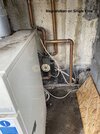Trying to get some wisdom from the forum elders here as I am doing bits and pieces around the house
I have an old boiler which I cannot afford to replace - It has one pipe from flow up behind some chimney and then two pipes return which are joined just before the green pump
With my June salary I will spend £140 to buy a new pump but for now I have bought a 28mm Magnaclean filter - I can only put it on the flow pipe from my thoughts - If anyone can suggest a better place on the return (which is where it should be) that would be very useful to know
If I put it on the return against the wall this will only cover part of the circut - What would you do - Magnaclean on single flow pipe or on part of the return

I have an old boiler which I cannot afford to replace - It has one pipe from flow up behind some chimney and then two pipes return which are joined just before the green pump
With my June salary I will spend £140 to buy a new pump but for now I have bought a 28mm Magnaclean filter - I can only put it on the flow pipe from my thoughts - If anyone can suggest a better place on the return (which is where it should be) that would be very useful to know
If I put it on the return against the wall this will only cover part of the circut - What would you do - Magnaclean on single flow pipe or on part of the return


